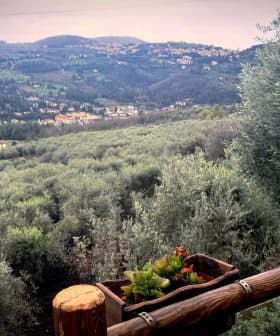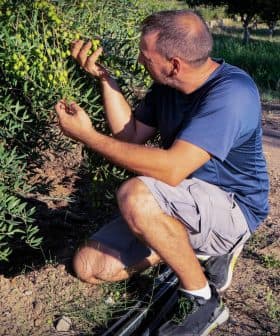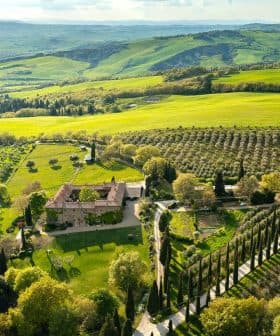Award-Winning Portuguese Producers React to Initial NYIOOC Results
With 16 awards so far, Portuguese producers have built on their traditionally strong performance at the world's most prestigious olive oil quality competition while they underscore the diversity of the region's offerings.
 Trás-os-Montes Company, from northern Portugal, won three awards this year.
Trás-os-Montes Company, from northern Portugal, won three awards this year.The NYIOOC World Olive Oil Competition took place despite uncertainty, with Esporão Selecção from Portugal winning one Gold and two Silver Awards. Portugal has already won 16 awards in the competition, showing consistent quality and potential to become the third-largest olive oil producer in the world by 2030. The competition, which received 881 entries from 26 countries, is helping to boost the visibility and quality of Portuguese olive oils on an international scale.
“Until recently we didn’t even know if the NYIOOC was going to take place,” Ana Carrilho, production manager of Esporão Azeites, told Olive Oil Times. “Finally, it did and we are very happy.”
Esporão Selecção, a well-established brand from Alentejo, Portugal’s main olive oil producing region, has won one Gold and two Silver Awards at this year’s edition of the NYIOOC World Olive Oil Competition, which is revealing its results every day this week.
This award means that we are among the best in the world and tells us that we are doing good work in the olive groves.
“We are very glad about the results and about the fact that year after year, they are consistent. Especially in such a difficult year,” Carrilho added.
The competitions organizers announced in March that the international panel would remotely judge the quality of the competing olive oils due to the mobility restrictions imposed by the coronavirus crisis.
See Also:More From the 2020 NYIOOCThe competition registered 881 entries from 26 countries for its eighth edition. With 52 entries – a slightly lower figure than the 67 participants in 2019 and 2018 – Portugal has already won 16 awards, eight Gold and eight Silver, consolidating its strong performance at the annual contest. The results will continue to roll out through tomorrow, the NYIOOC said.
In the 2019/20 season, Portugal harvested 125,400 tons of olive oil and a recent study suggests that Portugal has the potential to become the third-largest producer in the world by 2030.
“We are very glad. This is the biggest contest in the world for extra virgin olive oil and it gives a lot of exposure to the brand,” António Duarte, the sales manager of Monterosa, told Olive Oil Times. “This year is the sixth consecutive edition in which we participated.”
“One thing we appreciate is the good communication environment around the competition,” he added. “This has helped us to start working with some new companies and for such a small producer like us, that’s very important.”
Monterosa, whose 37-acre estate is located in the southern region of Algarve, won two Gold Awards at the NYIOOC for its Cobrançosa and Picual oils and two Silver Awards, for its blend and its Macanilha de Tavira, a traditional cultivar from the area.
“Algarve is not very well known for olive oil and these awards show that it is possible to produce high-quality oil anywhere in the country,” Duarte said.
Although some 70 percent of the country’s production is harvested in the Alentejo region, regional diversity is a key factor to understand Portugal’s olive oil sector.
The Iberian country’s oil exports more than tripled in the last decade, growing from 51,774 tons in 2010 to 158,688 in 2019, according to Casa do Azeite, Portugal’s olive oil producer association. But, apart from increasing its production, Portugal is strengthening its profile as a high-quality producer.
Azeite Angélica is also a family producer, but in this case based in the region of Moura, in Alentejo. They won a Gold Award for their medium blend of local varieties Galega, Cordovil and Verdeal at the NYIOOC.
“Our olive trees are ancient, non-watered trees. That, along with our bet on traditional cultivars, is key for the quality of our olive oil,” Gonçalo Rosa da Silva, Angélica’s producer, told Olive Oil Times.
“Nowadays, Portuguese olive oils are at the same level as the best ones in the world,” Rosa da Silva added. “Our local varieties are very complex from an organoleptic point of view and that quality is reflected on international awards such as this.”
“The NYIOOC is a competition that offers great visibility and the Best Olive Oils Index has become a reference within the sector,” he continued. “This award means that we are among the best in the world and tells us that we are doing good work in the olive groves.”
Duarte pointed to the years of the latest economic crisis as a turning point for the olive oil sector in the country.
“Portugal lived through a very tough economic crisis a few years ago and producers started to shift direction,” he said. “We saw many producers investing in new machinery and focusing on better quality in the last few years.”
Carrilho agreed that Portuguese oils are following a positive trend, both in terms of quality and quantity.
“If we talk about new trends in olive growing, we need to talk about Portugal,” she said. “Basically because we have started from scratch and most of the new olive groves and olive mills are focused on quality.”
“Our aim is to make a difference thanks to the quality and to our local cultivars,” Carrilho added. “I’m optimistic regarding the future of olive oil in Portugal. And I am glad that every year there are more and more award-winning Portuguese olive oils.”









